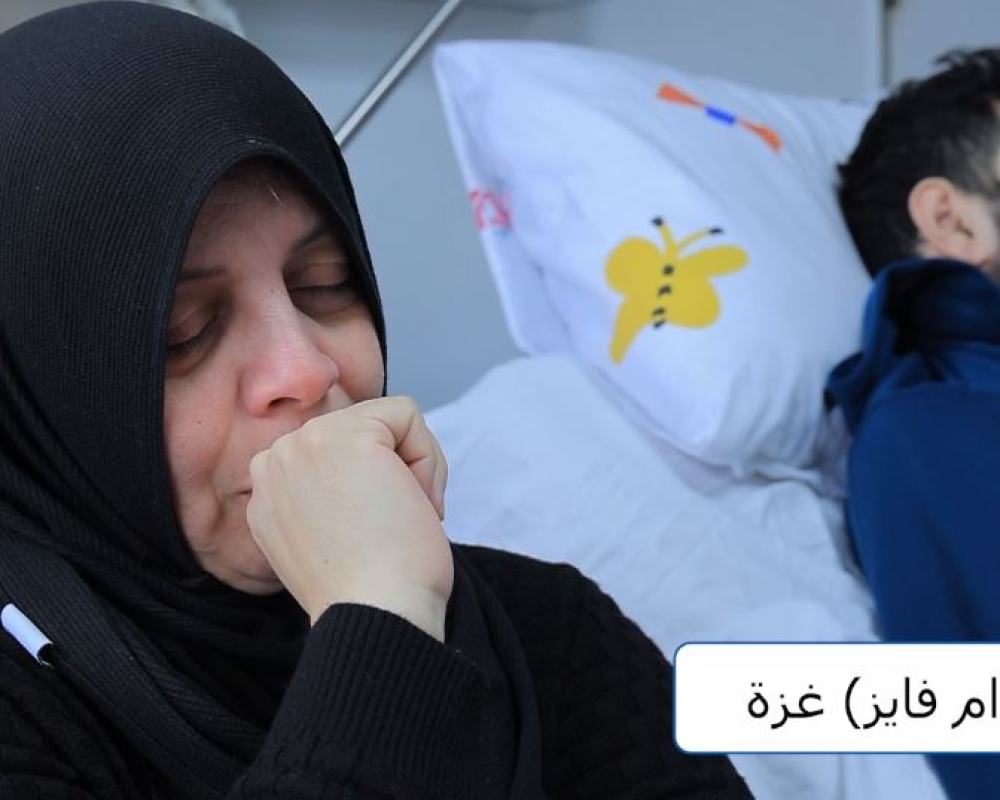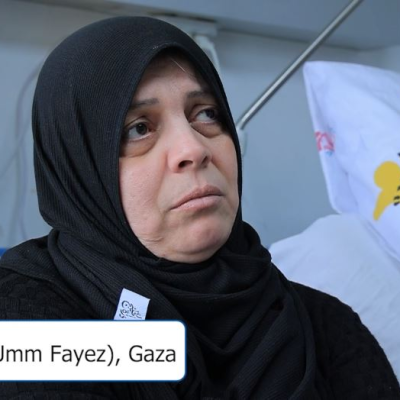
Gaza / Bethlehem / PNN /
It is said that tragedies in wars only begin to unfold after the silence of the cannons. But in Gaza, they unfold every day before the eyes of a world that shamefully remains silent as it witnesses war crimes and genocide.
Hanan Abu Rayya, Um Fayez, a Palestinian woman from Gaza, is someone who will never forget nor forgive the world for its refusal to stop the genocidal war that killed her family. Having fled from the the al-Rimal neighborhood in Gaza, which was being systematically destroyed by the Israeli Occupation force, her daughters and sisters were martyred in a brutal Israeli shelling of the family’s home in the Tel al-Hawa neighbourhood.
Abu Rayya, a mother of four daughters and three sons, survived the massacre that took her family away. Now her only wish is to see her daughters, even just for one single moment, to embrace them and smell them, and once more be near the girls she loved so much. But ‘Mother Fadi’ won't be able to, because her daughters were murdered in yet another barbaric Israeli bombing of the house where her family had gathered to escape the shelling.
Because she was not in Gaza at the time, Abu Rayya escaped death along with her son Fadi, a construction worker who was paralysed after falling from the fifth floor of a building in April of last year. After spending a number of weeks in a coma, Fadi woke to be informed by doctors that he was paralysed, and so began his and his mother’s search for treatment.
Um Fayez recounted those days and how lucky Fadi was to survive after such serious injuries. "We headed outside the sector and travelled inside the Green Line,’ she explained. ‘On arriving at a hospital at 2 am, Fadi had to undergo immediate surgery when an MRI scan found him to have a bleed on the brain. The doctors told him that if he had waited until dawn, Fadi would have died due to the severity of the bleeding.’
Fadi’s mother explained that the hospital in Gaza had previously told them that Fadi had not suffered any serious injury to his head, but his fifth, sixth, and seventh vertebrae had been broken, his spinal cord was damaged, and consequently, he had suffered complete paralysis. As they continued searching for treatment between hospitals in the interior and the West Bank, they reached the Beit Jala Governmental Hospital on October 2nd, five days before the outbreak of the war on October 7th.
Um Fayez said that she had not seen her daughters for six months, as they were back in Gaza, but she communicated with them day and night by phone and social media. She recalled how, during the early days of the war, she could hear her daughters screaming while talking to them. '"Mom, we are dying" they told me,' she recalled. "There is no safety from the shells above our heads."
As a result of her daughters’ terror, Abu Rayya contacted her sisters in Gaza and asked them to look after her family. She told them that they would be responsible if anything happened to her daughters, as she was far from home and unable to return due to her desperate search for treatment for Fadi.
Abu Rayya explained that one of her sisters acted quickly, sending a taxi for her daughters that took them to stay at her house. She said that Malak, Nouran, Tooto, and Awad went to their aunt's house in the Tal al-Hawa area after escaping from al-Rimal, where they stayed until they were tragically martyred.
Recalling the moment she discovered her children had been killed, Abu Rayya said she had reached the fourth floor at Beit Jala Hospital, where, in the doorway, she saw a man standing.
‘I was coming out of the room,’ she recounted, ‘and he asked me, “Are you Um Fadi?” I told him that I was. 'Come with me,' he said.’
'I went with him and we entered a room full of people. At that moment, I felt something covering my eyes. I saw the world in white, and I sensed something was wrong, a feeling of grave danger. "What's going on here?" I asked. "Have my daughters been martyred?"'
Those present told me to sit down. I asked them to clarify what was happening. ‘Has my sister been martyred?’ I asked.
'No,’ they said, ‘but come.’
‘With a sense of pain deep in my heart, I asked them again, “Have my daughters been martyred? Has my son been martyred?”’
One of the nurses turned to me. 'By God, my dear,’ she said, ‘I wish I could tell you no, but this is what has happened.'
Abu Rayya asked them to tell her who had been killed. ‘Is it Malak? Nouran? Tooto? Awad? My sister? My husband? Who? Please understand me. Who is alive, and who is dead? Are they dismembered, wounded or are they okay? What's going on? Explain to me.’
Um Fayez said she remembers hearing the words that she had been dreading, words that broke her heart. ‘We have received news from Gaza. The five-story villa was bombed, and all of them are under the rubble.'
She recalled screaming and saying, 'I wish they had waited for me.' After that, Um Fayez said she remembered very little. ‘I didn't wake up until the second day,’ she explained. ‘I don't know what happened."
Abu Rayya, the grieving and patient mother who lost her entire family, now lives in a state of anger and sorrow at the Beit Jala Arab Society Hospital, where her surviving son receives treatment as a result of the injuries he received before the war. She says her tears have not dried, and she cries as she tells her story.
"I no longer have a life after my daughters and my son. Not in Gaza nor anywhere else. I have lost not just my daughters, but my sisters too. They were my life and lived in my heart. There was no difference between them and my daughters. They supported me through everything."
With the tears rolling down her cheeks, and her voice cracking with pain, Um Fayez described how her world had been turned upside down, and nothing would ever be the same again.
“There is no life now in Gaza for me to return to. No home, no daughters, no children. No one is left.”
